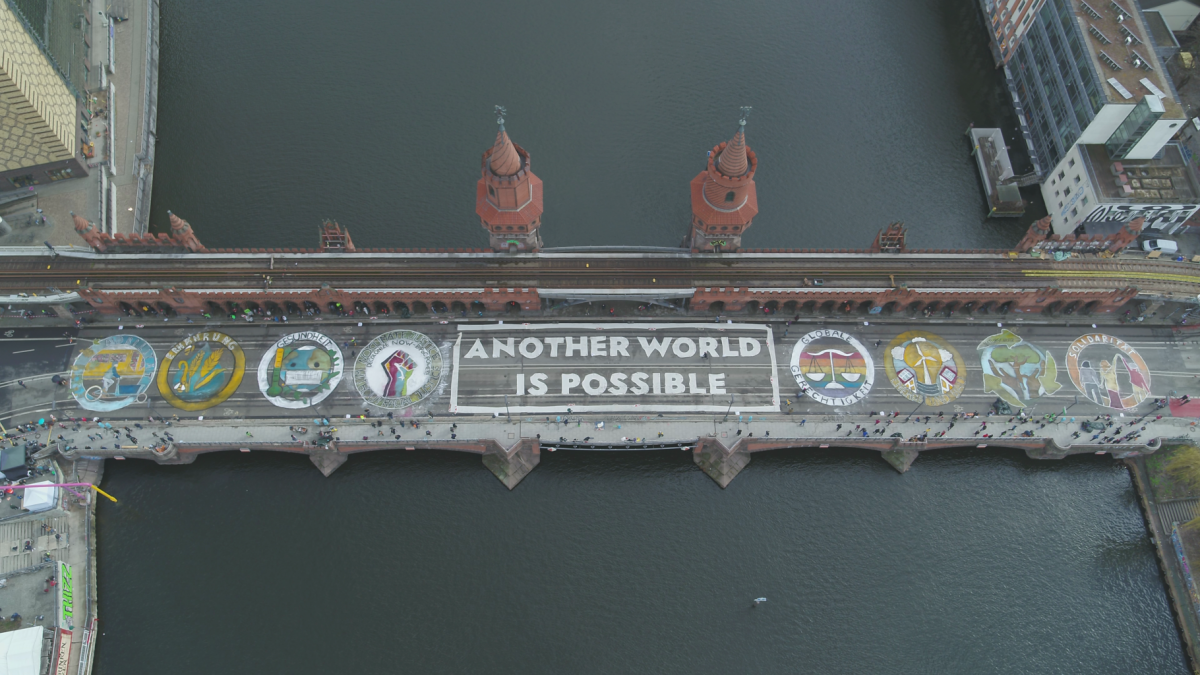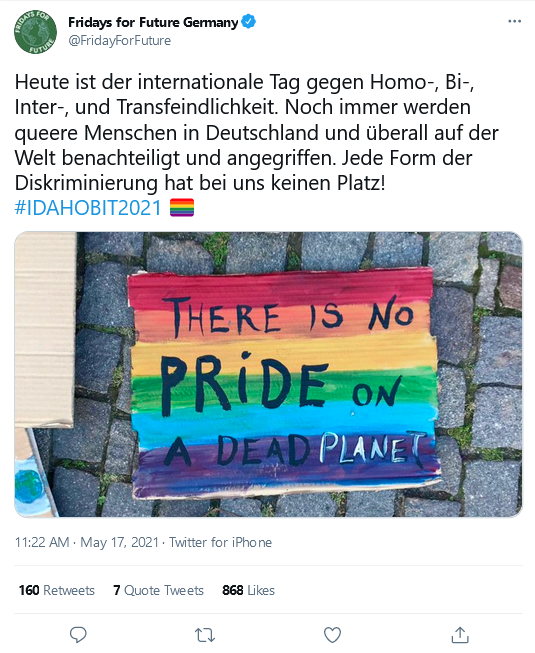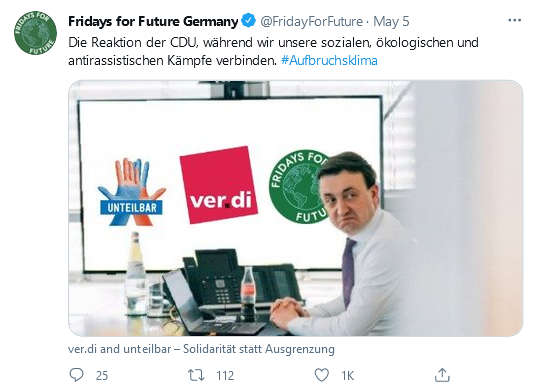For German youth activists, climate justice means more than getting to net-zero
It is early May when Fridays for Future, anti-racism alliance #Unteilbar (‘indivisible’) and the service workers union Ver.di host a joint virtual press conference to announce their cooperation in the run up to the federal elections in September. Though the groups differ in nature, they explain that their “Leitbilder” (‘mission statements’) are the same: fighting for social justice, climate justice, anti-racism, strengthening democracy, and providing an alternative voice to the political right -- which for Ver.di representative Frank Werneke includes chancellor Merkel’s conservative party -- and the extreme right. On 29 May, one week before the state elections, the groups will jointly demonstrate in the east German state of Sachsen-Anhalt, where the CDU and the populist AfD are leading in the polls.
“Social justice without climate justice isn’t possible,” Fridays for Future press speaker Fabia Klein later explains over the phone when asked about the collaboration. “And neither is climate justice without social justice. We have to face these crises and their solutions together.” The cooperation between Fridays for Future and Ver.di has been going on for over a year. In July 2020 the groups brought bus drivers and other public transport workers out to the streets to call for a sustainable mobility transition that creates job opportunities at the same time. Both the pandemic and last year’s Black Lives Matter protest have brought social injustices further to the surface, the 19-year-old high school student says, underlining the need to “get everyone on board”.
A just transition
In recent years, climate has become a central topic in German politics. Whereas during the last federal elections in 2017 it was mainly the Green party calling for ambitious climate policies, now parties across the spectrum are putting the topic at the heart of their election programmes. In contrast to four years ago, the Greens are, for the first time, leading the polls, signalling that climate is a priority for many German voters. In a case started by climate activists, Germany’s highest court recently ruled that the government’s climate legislation falls short, a landmark decision that increased the momentum for more climate efforts. Only two weeks after the verdict, Merkel's cabinet pulled forward the climate neutrality target by five years to 2045. Now that climate protection has become mainstream, the question is not whether the country should transition to a clean energy economy, but how it should do so. For Fridays for Future, the transition should not only mean reducing emissions to zero as quickly as possible -- the group calls for a 2035 net-zero target -- but also ensuring that the transition is a just one. The young activists argue that the climate crisis is inextricably linked to issues of social injustice -- including economic inequality, racism and sexism -- and argue that to fight the former, you need to fight these issues all at once. For them, it is the same fight.
Broadening the climate movement to include many social issues can threaten to dilute the climate message, as dividing attention among a range of topics leaves less room for in-depth criticism of specific policies. It could also help to sharpen the focus of the movement by putting the emphasis on the type of society that activists want to see -- rather than calling for abstract emission reduction targets. The intersectional approach can attract new members who were not previously engaged in climate activism, or it could alienate those who do not share the same progressive views. As the election campaign picks up speed, conservatives formulate their own answer to the climate crisis, one based on market solutions and innovation, while the left, progressive wing of the climate movement call for a systemic transformation to a green and social economy.
“We see that a generational movement of students tries to link its interests with a more traditional movement, the labour movement,” Markus Wissen, political scientist at the Berlin school of economics and law, tells Clean Energy Wire. “They know that as a generational project alone they will not be able to change the way things happen,” he adds. The alliance between the groups is a way for Fridays for Future to broaden their scope and constitute more common interests, according to Wissen. “The success of social movements depends on how well they can embed their demands in the everyday lives of people. Forming alliances can help with that.”
Conservatives for climate
The massive school strikes in 2019 prompted conservative party member Wiebke Winter to learn more about climate change. “I was, ironically, on a plane when I listened to a podcast and realised the climate discussion has been going on since before I was born,” the 25-year old tells Clean Energy Wire. Though inspired by the movement, she decided not to join Fridays for Future. “I think they are doing it the wrong way,” she explains. “They are calling for a system change, for the end of capitalism, but I believe capitalism is the only social system in which we can really fight the climate crisis.”
Winter is the youngest conservative direct candidate running for a seat in federal parliament in September. She is also a board member of the CDU/CSU, the chairwoman of the young conservatives, and pursuing a PhD in medical law. In April of this year, she co-founded the KlimaUnion (‘climate union’), a group that pushes for more ambitious climate policy within the conservative party. The KlimaUnion proposes market-based solutions to reach the 1.5-degree Paris Agreement goal and climate neutrality by 2040 - five years sooner than Germany’s current target. Winter argues that, while some government regulation is necessary, the restrictions that Fridays for Future calls for, for example on short haul flights or meat consumption, are not the way to go. “The transition is just too hard,” she says. Instead, Winter calls for technological innovation that will make the transition to a clean energy economy “as smooth as possible – but still ambitious”.
The 18-year-old Cedric Röhrich sees no such conflict between conservative politics and climate activism. Aside from his career as a writer, Röhrich is a member of the young conservatives and a supporter of the KlimaUnion, as well as an active Fridays for Future member in the west German area of Niederrhein. How does he reconcile the two? “The movement is highly decentralized and local groups work autonomously,” Röhrich explains. “In some areas they are very radical and anti-capitalist but, in my region, we try to make the connection to industry, for example by talking to the chamber of commerce and industry.” When it comes to collaborations between Fridays for Future and other social groups, Röhrich underlines that this is important, but that it should not happen too often. “Of course, all these issues are interlinked, and of course climate justice is a part of climate protection. But we are in the first place a climate protection movement, so we need to focus on that.”
Future for Fridays?
For Sheena Anderson, a fellow within the Mercator Fellowship on International Affairs focusing on intersectionality in international relations, the link between racism and climate change deserves much more attention. When raising the topic of racism in climate groups, Anderson has often been met by the response: “That is important, but let’s tackle the climate crisis first.” In 2020 she joined the Black Earth collective, a “space that felt like home”, where she found people who share this perspective. The collective was founded “out of frustration with the broader climate movement for failing to talk about how the climate crisis does not affect everyone equally”, she says. “Climate change increases existing injustices and is deeply rooted in racism, colonialism and capitalism. To truly tackle the climate crisis, we need to tackle all of these injustices,” Anderson says. “Of course, that complicates things, but it is a complicated topic. The more we get to the point of what it really is about, the better we can act and find solutions.”
"People in my hometown felt like Fridays for Future was just pointing the finger and telling people off for driving a car or eating meat. They were seen as elitist.”
During protest speeches and on their social media accounts, Fridays for Future call attention to a range of social issues, from homophobia to the position of refugees. At the same time, the movement receives criticism for not being inclusive enough. The climate movement should do more to speak to working class people, such as truck drivers or factory workers, argues Clemens Traub, writer of the book Future for Fridays? Pamphlet of a young Fridays for Future critic. The political science student enthusiastically joined many of the protests in his university city of Mainz in the west of Germany, but found two worlds collided when he went back to his small, rural hometown during weekends. “The people there felt like Fridays for Future was just pointing the finger and telling people off for driving a car or eating meat. They were seen as elitist.” To attract people from all across Germany, not just university students who live in urban areas, Fridays for Future should focus more on practical solutions for the climate crisis and work to “create a hopeful message”, Traub says.
Sharpening the focus
“Many of us activists at Fridays for Future are privileged, that’s true,” admits Fabia Klein. Creating an inclusive movement is a process, she adds. “We can’t change it from today to tomorrow, but it is important to work on it and reflect on where the problem is coming from,” she says, adding that the collaborations allow the different activist groups to learn from one another. Klein is not afraid that broadening the movement will take focus away from the climate crisis. In fact, she says, for Fridays for Future, creating justice and equality for everybody “is the focus”.
“The climate issue is a social issue, it has to do with colonialism, with racism, with patriarchal gender relations and with class relations,” underlines professor Markus Wissen. “Depending on how you combine these issues in your activism, you will not run the danger of losing the focus, but you can actually sharpen it,” he adds. Understanding exactly how these interlink with the climate crisis can strengthen the group’s activism and help them to “get a clearer picture of what the climate crisis is about and come up with better strategies to address it”.
On the 18 June, Fridays for Future will host an action day with protests across the country, joined by #Unteilbar and Ver.di. In the run up to the federal elections on 26 September, the group has more collaborations in the pipeline, though Klein cannot reveal yet which ones. “It’s important to show we are not just one organisation,” she emphasizes. “There are many people who want a better future.“




